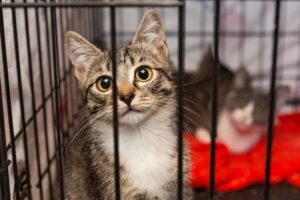No one enjoys having a sick child and, well, your pets are your babies, right!? Here at Mighty Pet, we feel that if we can prevent an illness, then we better take measures to prevent it.
#1 – Prevention will always cost less than the treatment for the illness.
#2 – We would never want to carry the guilt of a beloved pet falling ill, especially when we have the means to prevent it!
When your pets are in our care, we’re going to make sure they are provided the cleanest and safest environment possible. Our vaccination policy is one of our non-negotiable policies.
Occasionally, people question why we require certain vaccinations, like Bordetella and Leptospirosis. We want to take the time to provide background on these two illnesses and why we take precautions to minimize your pet’s risk while in our care.
Bordetella: Often called Kennel Cough, Bordetella spreads like a human cold. It is air born and can be easily transferred between animals or contaminated surfaces. Canine facilities, such as dog daycare centers, boarding kennels, dog shows, dog parks, grooming facilities and training classes, often require dogs to have the vaccine. Kennel Cough causes Upper Respiratory Inflammation, causing coughing and illness, that can eventually lead to secondary infections.
Due to the amount of social activity in our Day Camp, Overnight Lodge and visits from pet stores or other pet friendly public places, we strongly recommend protecting your pet against Bordetella.
Leptospirosis: This vaccine is often combined with the Distemper vaccine, but not all vets use this combination. Leptospirosis is bacteria and can be found throughout the world. In the United States, Leptospirosis is carried in wildlife and livestock. It is known to survive in areas of standing water, dampness and mud. Pets can become infected through contact with urine from infected animals, such as raccoons, skunks, rats, feral cats, dogs and other animals. Often, dogs contract the disease by swimming in stagnant water or drinking contaminated water in puddles.
Leptospirosis is also contagious to humans. Not all dogs that have contracted the virus fall ill, but they can still transmit it. Since we live in an area with a lot of standing water, mosquitos, livestock and wildlife, we feel that the exposure rate is higher than other areas of the country. In order to protect all dogs and Pet Care Attendants, we feel that requiring the vaccine to stay or play in our facility is an important part of prevention and creating a clean environment.




